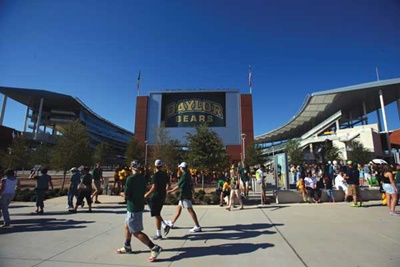The market for online intelligence tools is full of multiple platforms and sleuthy names such as Digital Stakeout, Black Planet and Media Sonar, according to a database compiled by Ray Johnson, Ilitch Holdings’ director of executive services and computer forensics.
Babel Street, provider of the Babel X platform, is named in part for the original Cairo road where several embassies sit. The firm is gaining traction in sports, said Clem McDavid, the company’s vice president of new markets and corporate development and a former IMG College executive.
 |
Baylor pays up to $20,000 a year to use Babel Street’s technology for football games and more.
Photo by: GETTY IMAGES
|
In addition to deals with the Carolina Panthers, Baylor University and Boise State University, the firm’s software has been used to track social media posts for the past two Super Bowls, plus the World Series and the Masters.
Babel Street’s newest client is the University of Alabama, pending a signed contract, after the SEC school issued a proposal this summer for “social threat monitoring.” The college is being proactive, considering that 200,000 people pack Tuscaloosa on a home football weekend.
Separately, Babel Street is in talks with the Washington Redskins and Jacksonville Jaguars, among other NFL teams, and with about 10 other colleges, but to this point no deals are signed, he said.
Jeff Chapman, a former naval intelligence officer with additional experience in the Treasury Department, founded Babel Street in August 2009.
McDavid and Chapman formed a friendship while attending Harvard. McDavid, who was a punter on Harvard’s football team, was IMG College’s director of national partnerships in February 2015 when Chapman hired him at Babel Street.
Chapman started his business signing deals in the defense sector in Washington and later expanded into law enforcement. He was eager to push his product into sports and brought on McDavid, who had relationships with power five schools through his former employer.
“We’re knocking down doors, but for a lot of these schools, it’s more about educating them rather than selling our software,” McDavid said. “Many schools don’t have the staff or the money to pay for it, but they understand they have got to have something in place.”
Babel Street’s fee structure is similar to cellphone data plans, McDavid said, based on the amount of users on an account. The cost for a single user can run from $15,000 to $35,000 a year, going up to $150,000 annually for five to eight users and adding premium services such as monitoring the dark web, a portion of the internet not accessible by traditional methods.
The challenge for the technology vendor is to find out who is responsible for monitoring social media among its potential clients, he said, something that varies by team. The Panthers, for example, have a few team staffers who do it on game days among their other job duties, said Lance Emory, the team’s executive director of risk management.
Emory, who previously was an FBI special agent, discovered Babel Street through a former colleague.
At Baylor University, where campus police use Babel Street’s system, staff training took two to three days to complete, said Mark Childers, associate vice president of Baylor’s department of public safety. The school pays up to $20,000 a year to use the technology.
“We looked at a number of these programs,” Childers said. “Babel Street is all former Department of Defense guys. They all come from the intelligence field. That’s why I like them.”
Ilitch Holdings, parent firm of the Detroit Tigers and Red Wings, has both team and corporate officials engaged in online intelligence, and the number can increase if they’re playing rival teams or if the threat advisory level has increased in a broader sense, Johnson said.
“It’s not just limited to home games and events,” he said. “We monitor teams, business units and executives on the road. We also have good standing relationships with law enforcement, government agencies and other teams that monitor social media and share information that may be of concern.”




